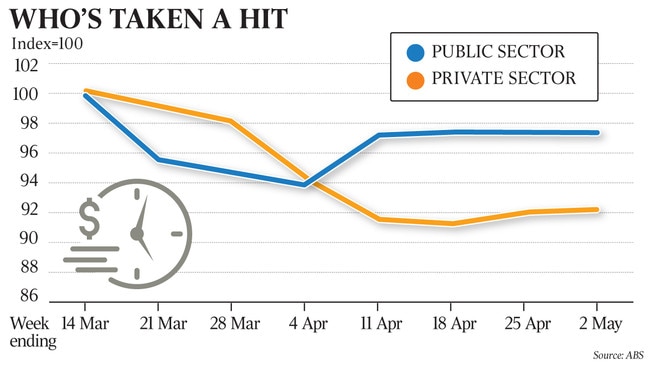Coronavirus: When it comes to jobs and pay, some are more in this than others
Private sector jobs have disappeared 4.5 times as fast as public sector jobs since state governments started to lock their states down.
A growing chasm between public and private sector pay and employment has cast doubt on the government’s claim “we are all in this together” when it comes to enduring the largest economic slump since the 1930s as a result of the coronavirus.
Private sector jobs have disappeared 4.5 times as fast as public sector jobs since state governments started to lock their states down in mid-March, according to analysis of pay and jobs data from the Australian Bureau of Statistics by the Institute of Public Affairs.
“This is further evidence that there are two Australias: those sheltered from the negative impacts of the lockdown measures in the public sector and quasi-public institutions, and those exposed in the private, productive sectors of the economy,” said Daniel Wild, research director at the IPA.
Since March, the private sector has shed 7.7 per cent of jobs compared with 1.5 per cent in the public sector, while the total wages bills of the two sectors had shrunk by 5.7 per cent and 2.6 per cent, respectively, the analysis found.
“It is clear we are not all in this together. There is no concept of shared sacrifice amongst the public sector workforce,” Mr Wild said.
Scott Morrison and the premiers have repeatedly said “we are all in this together” throughout the coronavirus crisis, which escalated dramatically in late March when state governments banned social gatherings and closed businesses where social distancing couldn’t be enforced, such as in restaurants and pubs.
As a sign of good faith with the electorate, governments have deferred pay rises for politicians, their staff and public servants, but stopped short of changes along the lines made in New Zealand, where Prime Minister Jacinda Ardern cut ministers’ pay by 20 per cent for the duration of the lockdown.

In March, Finance Minister Mathias Cormann said federal judges, politicians, staffers and public servants would not receive a scheduled 2 per cent July pay rise.
The IPA said it had been “highly conservative” in how it allocated jobs to the public and private sectors, using the tax office payroll data that has been published by the ABS fortnightly since early April to provide a more accurate signal of how the labour market was faring amid massive job losses.
“In all likelihood, the magnitude of private sector job losses and wage cuts are far more significant,” the IPA said in a statement.
“Governments must focus on boosting jobs and wages in the private sector, which means easing the lockdown measures faster than currently planned, cutting red and green tape, and making it easier for small businesses to employ new staff,” Mr Wild said.
The total number of jobs, excluding sole traders, had fallen 7.3 per cent between mid-March and early May, including falls of more than a quarter in accommodation and food services, the ABS said this week.
The IPA also found that in the four weeks to early May, public sector ranks had begun to recover, growing 2.7 per cent against a 1.3 per cent private sector fall.
Almost three-quarters of Australians want politicians and senior public servants on salaries above $150,000 to have pay reduced by 20 per cent, a recent poll commissioned by the IPA says.
ABS data shows over the year to March, public sector wages rose 2.4 per cent compared with 2.1 per cent for private sector workers.




To join the conversation, please log in. Don't have an account? Register
Join the conversation, you are commenting as Logout